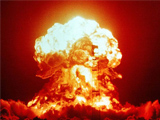Nuke Conference Fallout
By Dominic Moran for ISN
Nuclear Non-Proliferation Treaty (NPT) member states ended the last preparatory meeting (PrepCom) for the 2010 treaty review conference (RevCon) last week with few signs of significant progress.
Perhaps the most important development was an apparent shift in the US position on the atomic programs of allied non-NPT states with nuclear weapons capacities.
US Assistant Secretary of State Rose Gottemoeller, external pagespeakingcall_made at the meeting, said that, "Universal adherence to the NPT itself […] remains a fundamental objective of the United States."
Israel's signing on to the NPT would require the declaration and destruction of the thinly veiled Israeli nuclear arsenal, thought to number up to 200 warheads.
The US has always sought to shield the Israeli program from scrutiny, and the apparent change in Washington's stance was met with considerable consternation in Israel.
There appears a danger here of a complete misreading of the strategic implications of an Israeli revelation of its nuclear weapons capacity.
US regional allies have long called for Israeli WMD disarmament, but understand that this is implausible in light of the perceived Iranian nuclear threat, to which they themselves are seeking to respond. Indeed, in an unofficial joint statement in March 2008, Arab League foreign ministers external pagereportedlycall_made warned Israel not to end ambiguity, threatening a walkout from the NPT.
ISN Security Watch has not been able to confirm the veracity of the latter statement; but, if true, it constitutes a shot across the bows of the Israelis that the Obama administration either missed or chose to ignore.
Efforts to promote Israeli, Indian, North Korean and Pakistani nuclear weapons disarmament are best conducted as an integral part of wider talks on issues of war and peace and bilateral and multilateral relations and incorporated within a broader discourse on graduated WMD disarmament.
The US, EU and Russia will be hard-pressed in 2010 to secure gains on their concerns regarding the control and security of nuclear fuel supplies and technology transfers - especially with the Non-Aligned Movement states bracing for a conflict on these issues as they look to secure their treaty rights to untrammeled civil nuclear development.
The IAEA announced at PrepCom that it had reached its funding target for a low enriched uranium fuel bank intended for use by prospective nuclear states. The bank would be a significant step in efforts to prevent new nuclear states from pursuing fuel cycle activities of potential relevance to covert weapons development.
Embarrassingly for Egypt, which is pursuing an energy reactor program, its opposition at PrepCom to extending NPT security measures came amid revelations that both high and low enriched uranium traces had been found at its Inshas research reactor facility - indicating small-scale, unreported fuel cycle work.
The NPT is supposed to, but fails to, provide a safety net guaranteeing that civil nuclear programs will not be used as the jumping-off point for weaponization, relying too much on the goodwill of member states and a limited IAEA inspections regime.
The bolstering of the NPT's non-proliferation mechanisms and eventual universality is crucial to easing the profound threat of nuclear war and accidents to regional and global security and the environment.
However, under the cloud of the Iranian crisis and non-signatory weapons development, the prospects for genuine progress towards an effective non-proliferation regime appear slim to nil.

